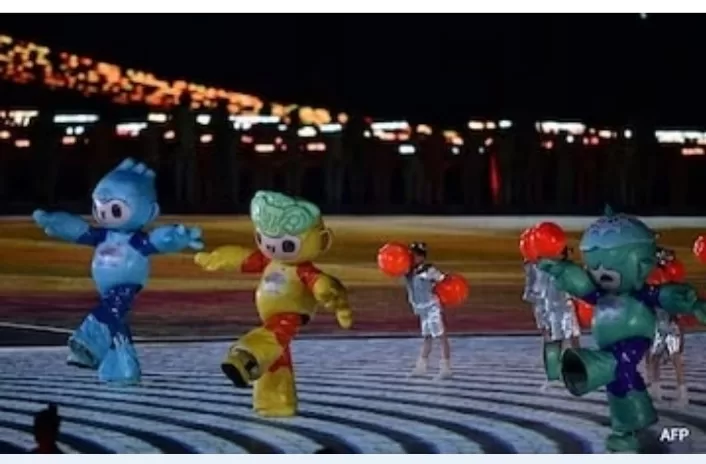Chinese President Xi Jinping inaugurated the 19th Asian Games with grandeur and panache during a vibrant ceremony in Hangzhou on Saturday, heralding the commencement of a two-week sporting spectacle that boasts a larger athlete contingent than the Olympics itself.
The event, which had been postponed by a year due to China’s now-discarded zero-Covid policy, will witness the participation of over 12,000 athletes hailing from 45 nations and territories, competing across a staggering array of 40 sports disciplines.
In a dazzling spectacle held at the Hangzhou Olympic Stadium, also fondly referred to as “the Big Lotus,” President Xi Jinping received an enthusiastic reception from the audience, who waved miniature Chinese flags in jubilation. Syrian President Bashar al-Assad, making his first visit to China since the commencement of the Syrian civil war in 2011, was in attendance. He rose in applause as his nation’s athletes entered the arena, earning thunderous cheers from the crowd.
Among the dignitaries present were International Olympic Committee President Thomas Bach, as well as leaders from countries such as Cambodia, Kuwait, Nepal, and others, all expected to partake in this historic event.
“The 19th Asian Games,” stated Raja Randhir Singh, acting president of the Olympic Council of Asia, “are finally here. The one-year delay was an unprecedented occurrence in OCA history.”
Security was notably stringent in the vicinity of the arena in the hours leading up to the ceremony, with roads closed and a strong police presence at every street corner. Rigorous security checks were conducted on spectators prior to entry, with items such as food and umbrellas being confiscated, although the recent cessation of rainfall was a small relief.
The theme of the ceremony revolved around water, simultaneously paying homage to Hangzhou’s rich historical and scenic heritage while acknowledging its status as China’s unofficial technology hub.
“I feel very happy and excited,” expressed a 35-year-old woman in the audience, reflecting the city’s honor at hosting such a momentous event.
Jung-Woo Lee, a sport policy expert at the University of Edinburgh, posited that the Games represented “China’s post-pandemic soft-power exercise.” Nevertheless, the event had already faced diplomatic tensions between China and New Delhi over the participation of three Indian wushu fighters, leading to the cancellation of the Union Sports Minister’s visit to the city.
China’s image as a premier sporting and business destination had been tarnished during the pandemic, with stringent lockdowns and travel restrictions resulting in the cancellation of nearly all international events in the nation.
Noteworthy is the participation of North Korean athletes, who, along with their counterparts from Taiwan, received hearty ovations as they made their entry into the ceremony. However, the loudest cheer was undoubtedly reserved for the host nation, China, widely considered the frontrunner to dominate the medals table, with Japan and South Korea vying for second place.
The Games encompass a wide array of sports, including staples like athletics, swimming, football, gymnastics, and cycling. A noteworthy debut is the inclusion of eSports as a medal event, seen as a step towards potential Olympic inclusion in the future.
The event also features regional specialties such as dragon boat racing, the Chinese martial art wushu, and kabaddi. Nine sports, including boxing, breakdancing, and tennis, will serve as qualifiers for the Paris Olympics next year.
The Games will unfold across 54 venues, 14 of which are newly constructed, primarily within Hangzhou but extending to cities as far as Wenzhou, situated 300 kilometers to the south.
Hangzhou, a bustling city with a population of 12 million and a mere hour’s bullet train ride from Shanghai, will showcase the latest in Chinese technology, including robot dogs, autonomous buses, and facial recognition systems.
In conclusion, while the 19th Asian Games officially kicked off on Saturday, several sports such as football, cricket, volleyball, and table tennis had already commenced. This monumental event, with its diverse array of sports and athletes, embodies the spirit of inclusivity, as affirmed by Wei Jizhong, honorary life vice-president of the Olympic Council of Asia: “We are open to all. This means our Games are not concentrated only for elite sportspeople.”







